Republicans made inroads with South Texas Latinos last election. Now, they’re hoping for a red wave
Pharr, TEXAS – Thelma Leal can’t escape the color blue.
She wore a blue blouse to her job at a furniture store. She drives a blue car. And for decades, she voted blue in every election.
In fact, her husband at one point ran for city commissioner as a Democrat. Until Leal, 63, started asking questions.
Why did she have to vote Democrat? Were there other options? Her husband’s father, a die-hard Democrat, told her “we vote Democrat because that's what we do.”
“What we do,” lo que hacemos has long been a creed in the Rio Grande Valley, a floodplain in the southern tip of Texas with blazing heat, where no one dared to run as a Republican. For more than a century, Democrats held many of the elected office seats, including at a local and state level.
Residents didn’t seem to mind much.
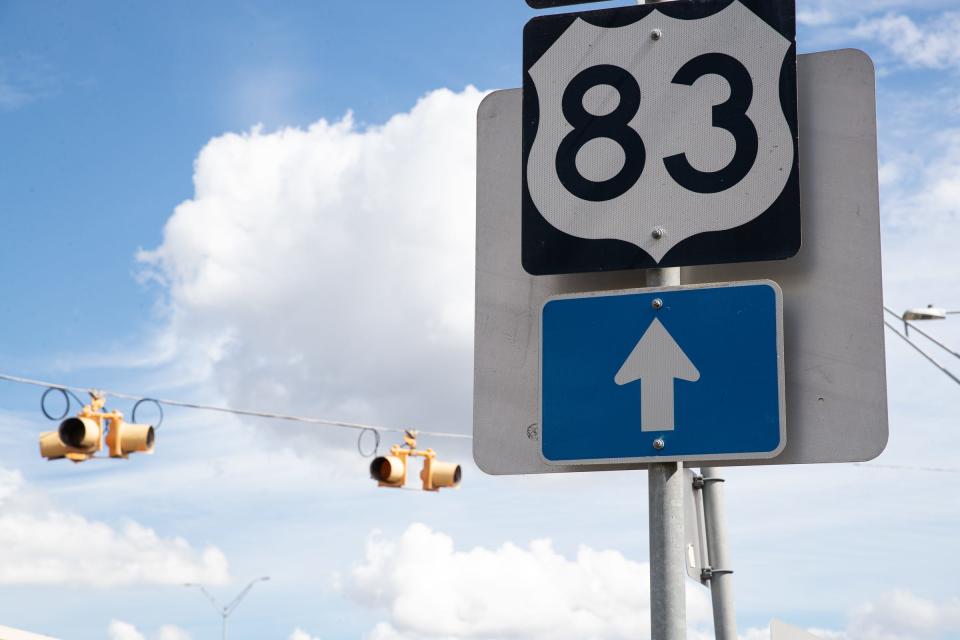
Being a card-carrying Democrat got buried under the pile of bills hidden in the bedroom dresser. Finances are private, after all.
They went to work — many blue-collar workers at restaurants, call centers and some border patrol agents – hoping to make it to the next paycheck. They barbecued carne asada fajitas and invited their primos, tías and abuelos over on the weekends. They went to the pulgas to find clothes or the latest accessory. Or even to just get out of the house. And, they voted blue.
“Why are we voting that way?” Leal said. "It doesn't mean we always have to go straight-line Democrat.”
Poll: Most Latino voters have already decided how they will vote, poll finds
She would soon discover some of her values didn’t align with the Democratic Party. She is “pro-life.” And her Christian faith – she regularly attends Laurel Heights Church of Christ in McAllen – is a key part of her life.
“I don't believe in shoving it down someone's throat but I also feel like I can't just turn the other cheek,” she said.
So Leal, and her husband, walked away from the Democratic Party.
They are among many members of this Mexican American community that is nestled along the Rio Grande River – or Río Bravo depending on what side of the border you are on – to make a pilgrimage to the Republican party.
These new-found supporters were already wielding influence in the 2020 election, when former President Donald Trump narrowed the gap in the presidential race from the 2016 election. Trump still lost to President Joe Biden in all four counties that make up the Rio Grande Valley: Starr, Hidalgo, Cameron and Willacy. Earlier this year, however, Mayra Flores, a Republican, flipped a traditionally held Democratic seat for the House of Representatives. She’s the first Mexican-born congresswoman to be elected nationwide.
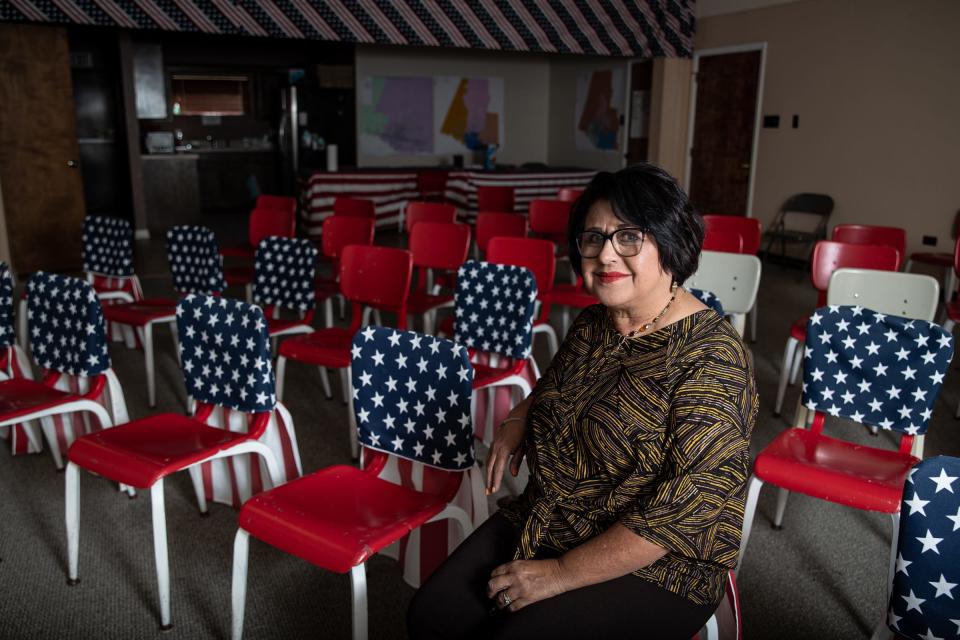
Ahead of the Nov. 8 midterm elections, local Republicans are working to expand the conservative movement in the Rio Grande Valley, which has a majority Latino population, and capture all three congressional seats in South Texas. Conservatives are recruiting homegrown candidates, many of whom attend high school and college there increasing voter outreach like canvassing and tapping into the voters’ heavily Christian background in an effort to expand the party’s reach.
Flores, Monica De La Cruz and Cassy Garcia, running in Texas' 34th, 15, and 28th districts, respectively, are now the faces of that movement.
The three women attend the same churches as their neighbors in the Rio Grande Valley. They eat at the same local restaurants, like Casa de Mariscos in Weslaco, Texas. And they want voters to know they share their values.
“Our Democrats are a different breed of Democrats. Many of them are pro-gun, many of them are pro-border security, and pro-life,” said Cameron County Republican Chairwoman Morgan Cisneros Graham. “So their party has gone through such a shift that they get them to that point where they're without party.”
Many of those Democrats are feeling a stronger connection to the Republican Party, Cisneros Graham said.
Others like Matt Barreto, president and co-founder of BSP Research, attributed possible party changes to redistricting.
Barreto said districts in this region have been gerrymandered, which include “very rural white communities” with high voter turnout that were put in these “Latino districts."
However, even with redistricting, the Rio Grande Valley districts have a majority Latino population.
For Vivian Tamez, who lives in McAllen and has voted Democrat for nearly two decades, the shift in her community is "very concerning."
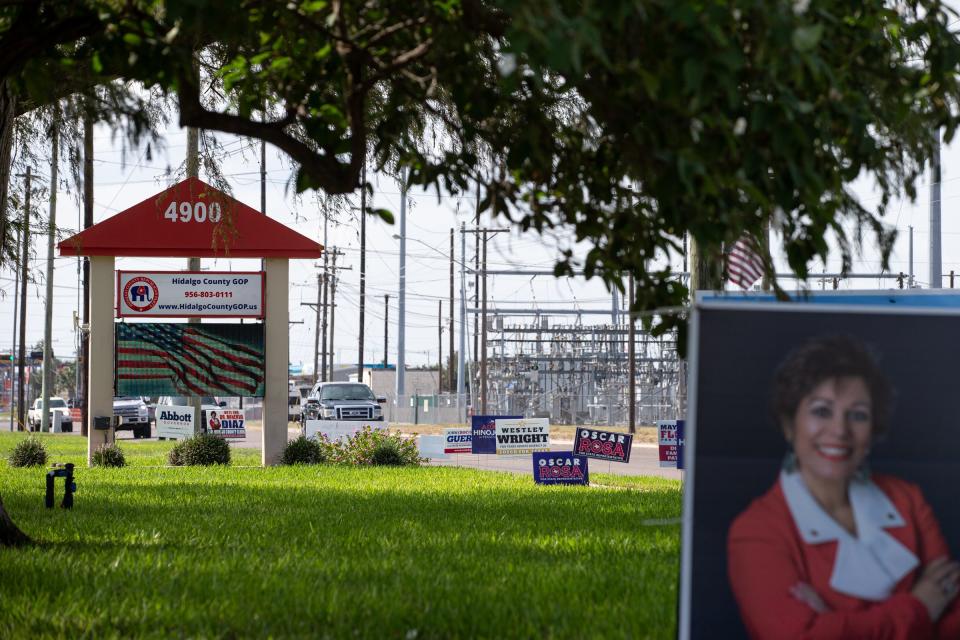
Roe v. Wade decision: Many Catholic Latinos don't think abortion should be illegal, despite personal views
The 53-year-old Catholic said she believes in voting for the party that “best represents you,” not just one policy issue, like abortion or immigration.
"I understand that people are concerned about the economy. I understand that people are concerned about immigration," Tamez said.
But mostly, for this remote Latino stronghold: They felt seen. They were finally heard.
“I've always been real hesitant when it comes to getting involved in politics or talking because it was always just like they’re just a politician, they're going to say whatever the wind, whatever the voters want,” Leal said.
Flores “wasn't like that,” said Leal, who sports a Flores campaign sticker on her blue Kia Niro SUV.
'God, family and country'
A chorus of chimes reverberated through the foyer of the Hidalgo County Republican office, a tan building on North 23rd Street, which is lined by many plazas in McAllen. The cluster of bells slamming against the glass door of the office space was like the bells ringing for the start of mass – but instead of worshiping God, those who walked in were putting their faith in electing Republican leaders.
A clear plaque with a list of at least 35 scriptures was at the center of a table draped with an American flag.
“1 Tim 2:1,” the first line of the list begins. “Heavenly Father, I give thanks for our government.”
Suddenly, Hidalgo County GOP chairwoman Adrienne Pe?a-Garza appeared from a back room with a smile, extending her hand out for a greeting before leading a tour of the office.
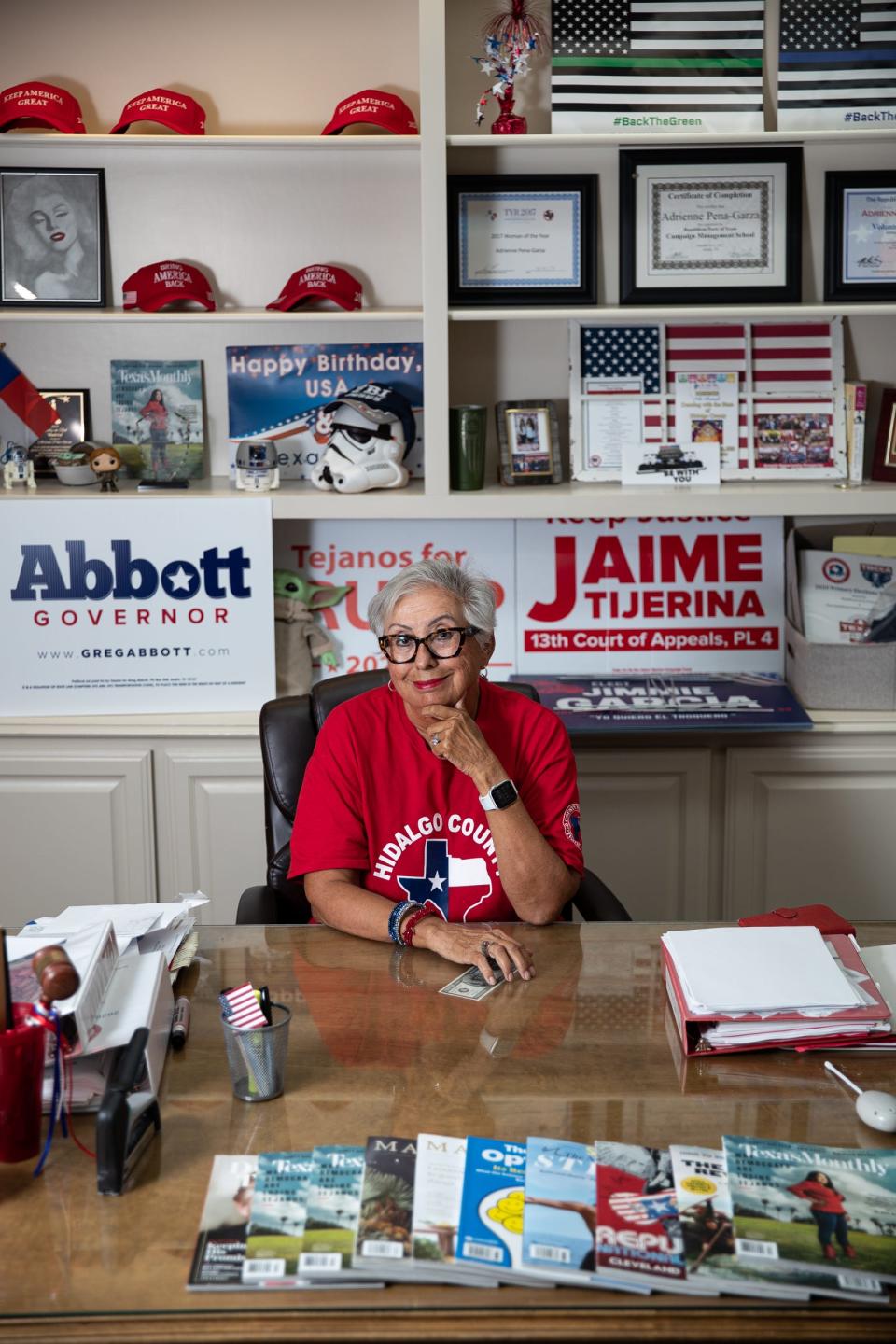
Blue balloons lined the archway to the large room filled with tables. In the back corner, cardboard cutouts of former Presidents Abraham Lincoln and Ronald Regan. A Donald Trump cutout was tucked between the two Republican icons.
Volunteers shuffled in to join a phone bank aimed at reaching out to voters about Republican candidates.
While some people didn't answer or hung up, the GOP county and campaign offices said they have seen more people come out.
“I think most Hispanics are traditionally conservatives,” said Hilda Garza DeShazo, a longtime Republican from McAllen. “They may not be Republicans, or they may register as Democrats, but inherently most Hispanics, I believe, are conservative people.”
Seated at a desk in a back office, Garza DeShazo rolled a piece of paper in her fingers. For Hispanic voters, she said, it comes down to “faith, family, work, discipline.”
The burgeoning shift for the region began during the 2020 presidential election and smack in the middle of the pandemic that was hitting the predominantly Hispanic area hard.
Children were doing virtual learning – a struggle for many families in the Rio Grande Valley where the median household income is $44,818 and most K-12 children qualify for free school lunches. Laptops and iPads are expensive. Mothers who had jobs to help with the weight of the expenses also had to stay home.
For those in the service industry – where majority of local workers are employed – walking into the H-E-B grocery store chain every day was a war zone. Masks could only offer so much protection. The same was true for workers at What-A-Burger or Taco Palenque and Walmart.
Smart analysis delivered to your inbox: Sign up for the OnPolitics newsletter
But bodies were starting to pile up in the Rio Grande Valley as more than 3,300 people died from COVID-19 that year alone. Morgues and funeral homes were overwhelmed. Trucks were temporarily set up to hold bodies. People had to wait days to see the bodies of their loved ones. In some cases, some never had a chance to say a final goodbye and were left to hope it was their loved one who made it into their grave.
Meanwhile, families' incomes were dwindling.
By the end of the summer, many were hoping to move on from the pandemic. They needed to because their livelihoods were on the line.
And Trump was running for reelection to bring the country “back to normal.”
"COVID was a big situation," said Tamez, a Democrat and public school teacher. With businesses shuttered, she went on, "they were afraid of what it's going to look like for them."
Biden's campaign message focused on how to tackle a public health emergency – including advocating for vaccines and personal protective equipment – and taking a cautious approach to reopening.
That's where Mayra Cantu, 42, from Edinburg, Texas, drew the line.
“They messed with two important things: My church and my kids,” said Cantu, a mother of three who volunteered to make calls at the GOP office.
She didn't believe families should be forced to keep children home. And, the decision to vaccinate her kids or wear a mask was hers alone.
“Nobody should be telling me what my kid needs,” said Cantu, who wore a red hat that said “U.S. Border Patrol” and a shirt that said “Silent No More!”
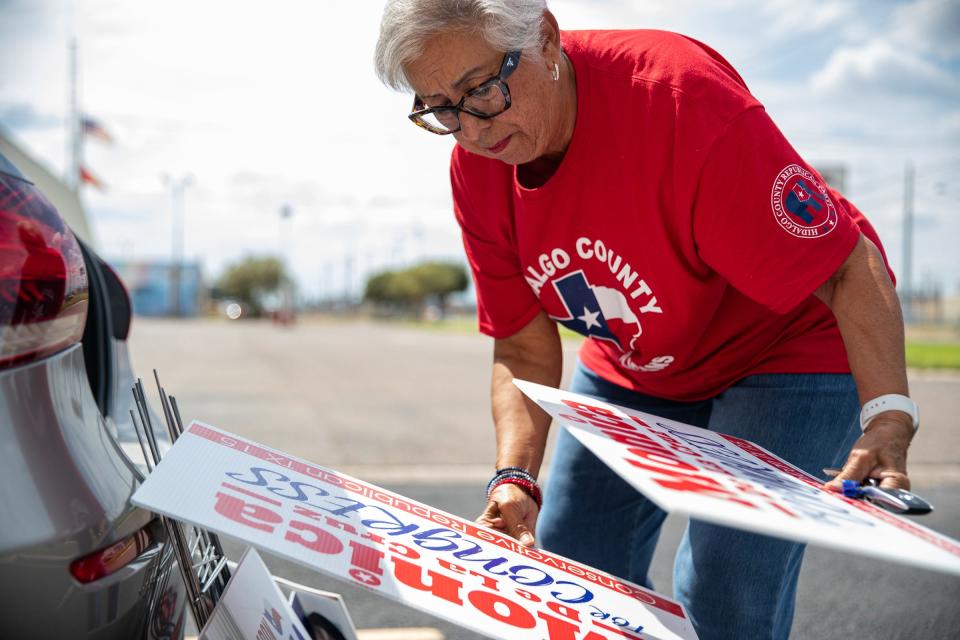
2024 election: Who will go first in the 2024 primary election? Democrats are debating the order
She voted, for the first time ever, in 2016 for Trump.
When Cantu cast her ballot for Trump again in 2020, she was part of a rising number of voters who made it to the polls that year.
Voter turnout rates in the Rio Grande Valley rose in 2020 to levels not seen in decades.
Biden beat Trump by 17 points in Hidalgo County, by 13 points in Cameron County, by 12 points in Willacy County (the smallest county in the Valley) and by just 4.9 percentage points in Starr County.
But just four years before, former Secretary of State Hillary Clinton kept all of Texas’ southern tip shaded blue on election tracking maps by more than 30 percentage points over then-candidate Trump.
Something was amiss.
As Trump narrowed the gap in 2020, now three Republican candidates running for Congress were determined to bring about the red wave.
Insider politics, Peter Piper and Casa de Mariscos
The three Hispanic Republican candidates know the Rio Grande Valley well.
That includes Cassy Garcia, originally from Edinburg, Texas.
Garcia is running against Rep. Henry Cuellar – one of the most conservative Democrats in the House – for Texas's 28th congressional district. That district includes Starr County, which saw a large increase in Republican voters in the general election. Garcia previously served on Sen. Ted Cruz’s campaign.
Through the glass door of her campaign office hidden next to a hair salon in a suburb outside of San Antonio, Garcia sat at the end of a long table, coolly leaning back on a chair while scrolling on her phone.
She straightened her back and cupped her hands in front of her on the table. Garcia released a campaign ad in mid-September giving glimpses of her upbringing in the Rio Grande Valley – including a photo from her first job working at the Peter Piper Pizza shop.
More: They paid taxes. Now undocumented Latinos are aging without savings, government care
For many Mexican American kids growing up in the Valley, a birthday party at Peter Piper was a dream come true. Compared to Chuck E. Cheese or Mr. Gatti's, it was by far the cheapest option but definitely a luxury. Parents saved up in their alcancías.
Some locations had a designated area for pi?atas.
That was all that she needed to connect with voters while door-knocking.
When the voter opened the door, Garcia said she became emotional.
The woman, who is raising a daughter on her own, told her: '‘Cassy, I just saw your ad on TV…you know we share a connection.”
They bonded over their love of Peter Piper, which led to sharing their views.
Garcia has been vocal about her faith, and how being part of a border patrol family – her husband is an agent – is part of her identity. And those values aligned with the voter, Garcia said.
“She says, ‘I'm voting for the first time as a Republican,’” Garcia recalled.
“If you look at the Democrats in South Texas, they're conservative, right? They're pro-God. They're pro-family, they’re pro-country. They're hardworking,” Garcia said during an interview at her campaign headquarters in Schertz, Texas.
Garcia isn’t the only Republican candidate running on her connection to the area code 956.
Flores, who flipped Texas's 34th congressional district in a special election earlier this year, graduated from San Benito High School, located in the city of San Benito – whose claim to fame is rock musician Freddy Fender. A water tower with an image of Fender can be seen from highway 83.
Further south, Monica De La Cruz, who is running in a tight race for Texas's 15th congressional district, is from Brownsville. Although Brownsville isn’t included in Texas' 15th congressional district, it includes parts of McAllen, Edinburg and Mission and extends upwards east of San Antonio.
Cantu, who is Catholic, said as a Mexican American, she was brought up to prioritize her faith and her kids. Her mother, who immigrated from Mexico, left everyone behind to allow her to have the freedom to live that way.
That's why she supports all three GOP women.
“If I fall into them changing how I raise my kids and how I want to praise God, I'm stepping over everything my mom sacrificed for,” Cantu said.
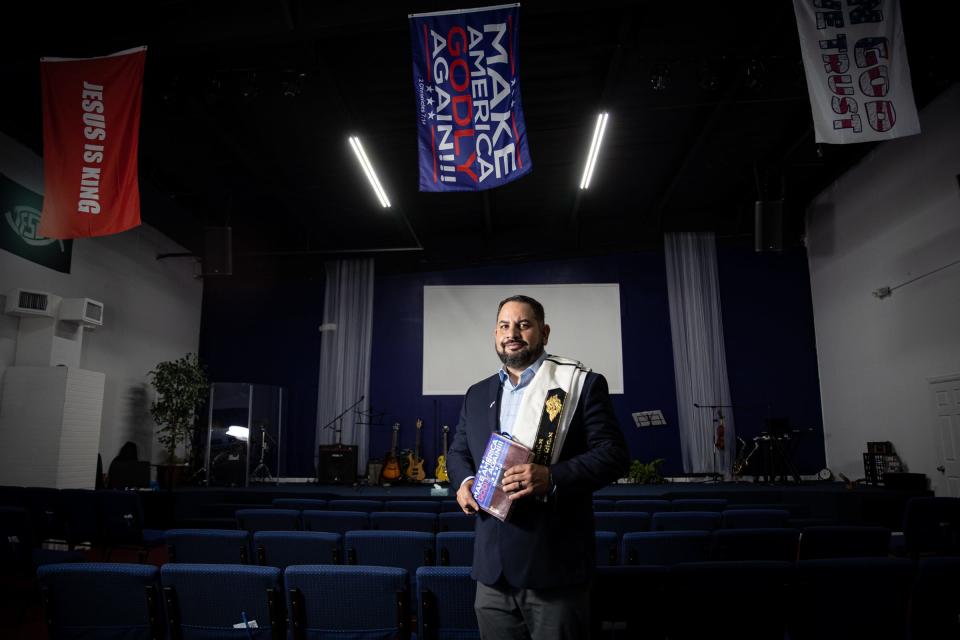
Flores went on to use the phrase “Make America Godly Again,” a slogan she borrowed from Luis Cabrera, pastor of City Church Harlingen, where Flores opened up her first campaign office.
Pulling up two chairs in front of a stage with a lectern and several guitars and drums behind it, Cabrera, who immigrated from Nicaragua, talked about how he began “prayer trains" during the 2020 election. He and volunteers would give out copies of the Bible, pray for people and blast worship music.
Cabrera said Christians will have a big role to play in future elections. Sometimes after his services on Sunday, they'll have organizers from Bienvenido, a conservative voter engagement group focused on the Hispanic community.
The pastor became one of Flores’ top confidants. After about three months of constant communication, Flores invited Cabrera and his team for dinner. She had something big she wanted to tell him.
Sitting in the back section of Casa De Mariscos, a Mexican restaurant staple, Flores announced to Cabrera that she was going to run for Congress. Melodies from the mariachi that walks around fill the rooms of the restaurant. The aroma of a botana, a platter of nachos, beef, chicken, or fried fish and rice and beans, fills your nose. It’s a place where families celebrate milestones, whether it’s a birthday or an engagement. And in Flores’ case, the start of her campaign.
“When we just put our voices together for the same cause, we’ll be powerful,” Cabrera said.
In four years, Cabrera has grown his church from about 20 people to more than 120 – a phenomenon happening in churches all over the area. According to Pew Research Center, 77% of Texans identify as Christian.
Many members of Cabrera's congregation voted in an election for the first time this year for Flores.
“If we mobilize ourselves and if we gather ourselves and organize ourselves as one voice, it's over. Every politician will fear that Latinos because of that,” Cabrera said. “We're going to hire you and fire you if you don't do a good job.”
NBC News/Telemundo poll: Less than half of Latino voters say U.S.-Mexico border is secure
Until two years ago, Saul Cantu wouldn’t say he was a Republican.
Actually, Cantu was on active duty and didn’t have much time to be involved in politics.
As a McAllen native, Cantu said he’d seen how long Democrats held office in the area. They were supposed to be for workers and the everyday man.
But still, families were poor. It’s hard to afford good, healthy food. Many in the Rio Grande Valley suffer from health issues, including diabetes. Cantu got tired of seeing that.
“We don't know what it's like with Republican leadership in the Valley because we haven't had it,” he said. “If we see like, whoa, you know, things got better this way, well, then good. We saw some change. If we don't, we don't."
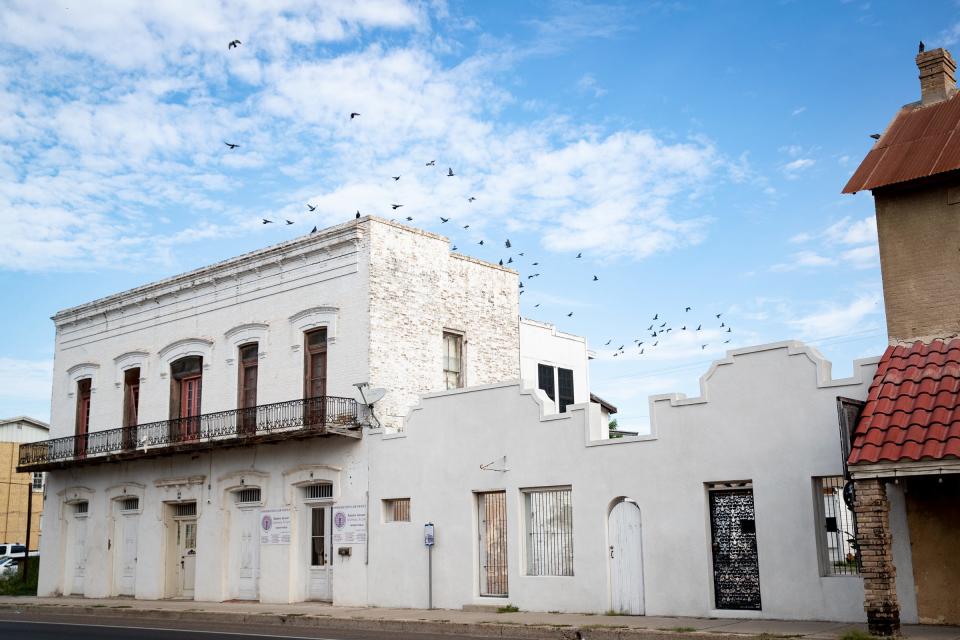
De La Cruz’s campaign invited the 30-year-old to a veterans forum earlier this year. De La Cruz asked questions: What services were missing for veterans? How can we better support you?
She made an impression on the Army veteran. “I just liked what she has to offer,” Cantu said.
Throughout their campaigns, Flores, De La Cruz and Garcia have asked local voters questions about what they want to see from Congress, what are their top priorities and how are they hurting. And for once, to some voters, it feels like the candidates are easy to get to.
“They call us the Texas triple threat, right?” Garcia said back in her office. "But we're all, you know, from the Rio Grande Valley and talking to voters who've been Democrats their whole entire life.”
And those same voters have felt like they only had “one person to vote for.”
“Now, we have an option,” Garcia recalled hearing.
A rise in block walking
On a sunny Friday morning, Claudia Alcazar gathered volunteers to spread a message during their block walk: “Vote Republican.”
Alcazar, 54, wants to build up the Republican Party in Starr County.
“Definitely, the National Republican Party is shocked with us,” Alcazar said. “Because prior to us organizing, we kind of had Republican chairs and whatnot, but the community really wasn't that enthused.”
Alcazar walked away from the Democratic Party two years ago. She was always encouraged to vote by her parents, especially by her father who was a World War II veteran. The Democratic Party was the only viable option then.
“It was difficult,” Alcazar, of Rio Grande City, said of switching to the GOP. “But in the end, it actually was something that it just kind of was fated.”
Midterm elections: Will Republicans flip the House in midterm elections? These 12 races will tell the story.
The Republican Party, along with the Flores, De La Cruz, and Garcia campaigns, have turned to grassroots campaigning, finding success in block walks as many volunteers have called them. All three Republican candidates have gone door-knocking throughout their campaigns, often getting face time with voters who may have never heard of them.
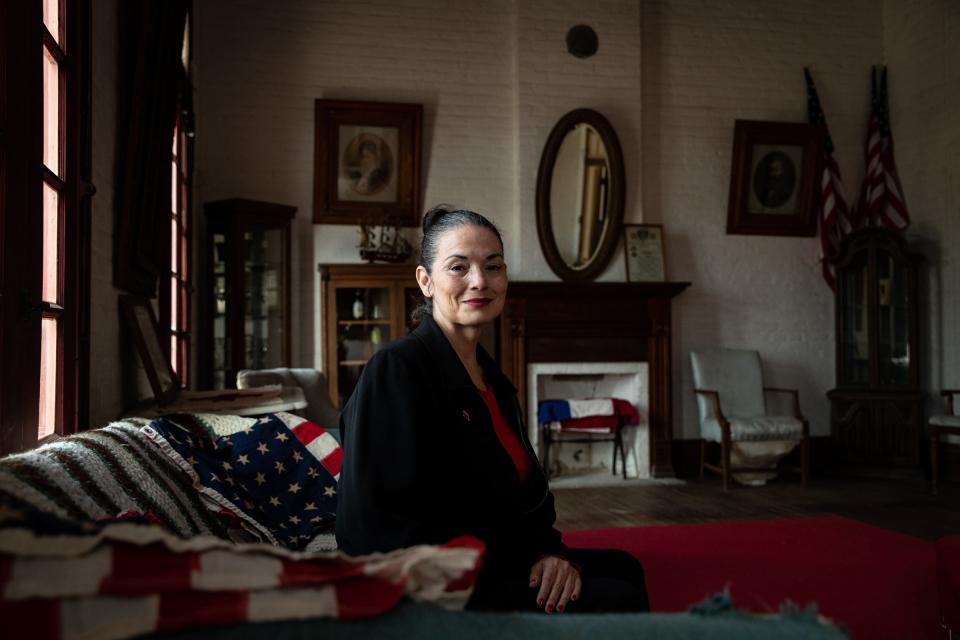
That level of grassroots engagement in the Rio Grande Valley is relatively new.
In the 2018 midterm election during his bid to unseat Republican Sen. Ted Cruz, Democrat Beto O’Rourke, who is currently running for governor, had a statewide door-knocking campaign. He only lost the election by roughly 2 percentage points, or just under 220,000 votes.
That type of organizing spilled over to the Republican side, where Trump Trains – which consists of people driving their cars and trucks around usually with Trump’s signature “Make America Great Again” flag, as well as other flags in support of Trump – were organically organized.
Overall, voter registration in many of the counties in the Rio Grande Valley has seen a jump due to the new level of engagement.
In Hidalgo County, there are 415,758 registered voters as of Oct. 11. That number was at 391,309 during the 2020 general election. Cameron County has also seen an increase with 227,181 registered voters as of Oct. 12. There were 218,910 registered voters in the 2020 general election.
But Republicans aren’t the only ones hoping to use grassroots organizing. Democrats are fighting hard to not cede their longtime hold on the Rio Grande Valley to conservatives.
“We didn't do a very good job of engaging the voters in 2020,” said Cameron County Democrat Chair Jared Hockema. “We weren't talking about the things that we need to talk about, that matter to voters along the border.”
And some Democrats are now fighting hard, making up for past mistakes the party made in the region.
Progressive Democrat Michelle Vallejo faces an uphill battle against Republican challenger De La Cruz in November for Texas’s 15th congressional district. The district leans likely Republican, according to Cook Political Report, which analyzes elections.
Republicans tightened the gap in the 2020 election, where Democratic Rep. Vicente Gonzalez saw his margin of victory go down to roughly 3 percentage points from 21 percentage points in 2018. De La Cruz has out-raised Vallejo, who is also getting limited support from national Democratic groups.
Vallejo said that she has had to reach out to people who may be traditionally Republican but feel like the current party doesn’t reflect their views.
“The fact that we've made it this far is really rooted and deeply rooted in a community-centered effort,” Vallejo said during an interview with USA TODAY. “We are not just focusing on talking with Democrats, we're talking with as many people as possible. People consider themselves as independent, people who have never even considered voting before.”
Vallejo is mirroring much of the same outreach efforts that her Republican counterpart is using.
School board elections: Republicans want to win school boards. They're winning in white counties by running on race.
“We can have really wonderful representation if we just keep showing up,” said 22-year-old Oscar López, a Democrat from McAllen.
He and other Democratic volunteers have been working overtime to try and make up for voters who left the party in the 2020 election by making calls, door-knocking and speaking with their families.
"Having those like daily conversations that may seem really small, but they really do affect people's lives," he said.
On a recent Saturday, Vallejo and her volunteers jumped in their cars to head to their designated neighborhoods, the group took a picture and chanted together: “Vamos por quince!”
Volunteers – mostly college-age – wearing bright pink shirts with yellow lettering that said “Michelle Vallejo for Congress” spent the morning knocking on doors.
But less than 10 miles from Vallejo’s headquarters, her competitor also had volunteers out.
That evening, a family gathered to eat after playing Rummy when the doorbell rang. It was hard to hear over the laughter and excited conversation between a mother, and her sisters, coming from the dining room table. The father kept barbecuing outside.
For a split second, the older woman almost didn’t answer. When she did, another woman around her age was standing there.
"Have you heard of Monica De La Cruz? What do you think about Greg Abbott? Let me know if you have any questions," the woman said.
She handed over two cards on what Republicans stand for.
Then, the woman went on to the next house.
Reach Rebecca Morin at Twitter @RebeccaMorin_
This article originally appeared on USA TODAY: In South Texas, Latinos are key to Republican hopes of a red wave
